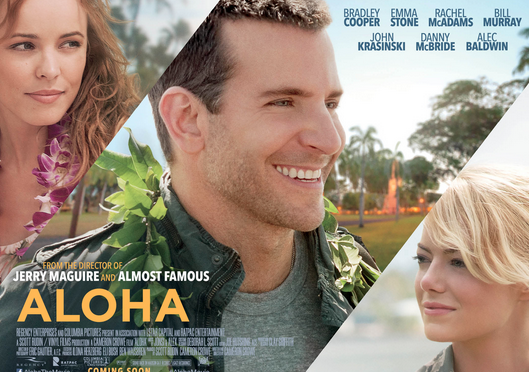Cameron Crowe has gotten a bad review for essentially every movie he’s done since Elizabethtown (or, depending who you ask, Vanilla Sky). In his twenties, Crowe had experienced a creative renaissance, starting with writing a book about being an undercover adult going to high school (which Never Been Kissed sort of ripped off) that was later adapted into 1982’s Fast Times At Ridgemont High. From there, Crowe went on to direct the John Cusack classic …Say Anything.
His cachet augmented in the 90s with the quintessential Gen Xer film (apart from Reality Bites), Singles. Four years later, in 1996, he re-emerged with the instant classic, Jerry Maguire, chock full of iconic movie catch phrases. Crowe kept his winning streak going with arguably his best film, Almost Famous, in 2000, based on his own experiences as a music journalist ingenue. Perhaps getting too big for his britches, Crowe waited only one year before making another movie (rather unprecedented based on his then former track record). That movie was 2001’s Vanilla Sky, a remake of a much better movie, Abre Los Ojos. It was possibly the film’s mixed reviews that prompted Crowe to wait another four years before making his first truly universally panned movie, Elizabethtown. It was six years between this and his next film, We Bought A Zoo, also lacking in memorability, as the straightforward title might indicate. And so this brings us up to 2015’s Aloha, a movie that can’t be discussed without considering Crowe’s history.
From the outset, Aloha was doomed to fail considering its release on the heels of Alexander Payne’s much more well-received The Descendants in 2011, which critics appeared to take far much less issue with in terms of accepting the white people prevalence (maybe Clooney has more clout than Cooper). Moreover, in spite of capturing the hostility native Hawaiians feel toward U.S. infiltrators in Aloha, the outrage over Emma Stone’s casting as the “quarter Hawaiian” lead character Allison Ng, a plucky fighter pilot freshly starting out in her career, was too great to ignore. With comparisons made to her role in The Help as Skeeter Phelan as the “white savior” with a so-called ethnic edge, Aloha never stood a chance at being taken seriously without people getting past the “all-white cast,” as they say. Which is rather a shame considering that the protagonist, Brian Gilcrest (Bradley Cooper), is an extension of Crowe in his current state, post-movie career washout.
Gilcrest, like Crowe, has suffered one too many blows to his professional career, causing most to doubt his integrity. As Allison puts it, “You’ve sold your soul too many times. No one’s buying anymore.” As an underdog in the military field after his career ended in scandal and the financial crisis of 2008 occurred, Gilcrest was forced into the morally grey area of reinventing himself as a private contractor, which is how he finds himself working for eccentric billionaire (is there any other kind?) Carson Welch (Bill Murray, whose iron-clad lovability couldn’t even seem to redeem Aloha for viewers). It is because of Welch that he returns to Hawaii after thirteen years, whereupon he immediately counters the ex love of his life, Tracy (Rachel McAdams), now married to John “Woody” Woodside (John Krasinski) with two kids, Mitchell (Jaeden Lieberher) and Grace (Danielle Rose Russell). Their flickering attraction to one another is still apparent, but Gilcrest has become too hardened by time to care much for dredging up the past.
Nonetheless, Tracy invites him over for dinner, where Allison also accompanies him, acting as his unwanted watchdog. The tension between Tracy and Gilcrest mounts when she tells him that she really loved him and was waiting for him to start a life together before he abandoned her. Gilcrest, not knowing what to say, is mercifully interrupted by the awkward appearance of Woody, who nonverbally expresses how threatened he is by Gilcrest’s presence.
His jealousy is unfounded, however, as Gilcrest soon gets spellbound by Allison’s mana (the use of Hawaiian terms are a bit uncomfortable) and lets his guard down for the first time since Tracy to allow Allison a place in his seemingly nonexistent heart. And, while yes, the signature brand of Crowe schmaltz is present (this is the man, after all, who interviewed his film idol, the king of “meet-cute” romance, Billy Wilder, for a comprehensive book called Conversations With Wilder), it is somehow tolerable to the relationship enthusiast. But alas, in part, this sort of maudlinness is why Aloha, and rom-coms in general, can’t be digested easily by the masses.
Crowe almost had it in the bag until the final scene, which is bathetically emotional and largely unnecessary. Unfortunately, audiences found more than just the last moments of the film to be an affront, which is a real shame for Crowe, who is now planning to direct a TV movie for his next project. It’s a slippery slope from here.






















[…] the back to back release of the somewhat overly maligned Aloha and Burnt, Cooper has proven that he finds comfort in playing the part firmly established by Pat in […]